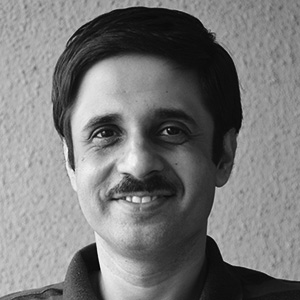Citation

Professor Subimal Ghosh has made profound contributions in the area of understanding land-atmosphere interaction in the complex South Asian summer monsoon system and the study of meteorological extremes. His work has established that 20%–25% of the moisture contributing to precipitation in India during the end of the summer monsoon has a terrestrial origin. Further, he showed that contributions from land influence interannual and intraseasonal variability of the summer monsoon, as well as increase widespread extremes over central India. He has also contributed to extremes in urban environments by showing the role of urban morphology and urban structure in generating eddies that result in instabilities with intensification of extremes in urban pockets and increase in spatial variability.
Subimal Ghosh completed his doctoral studies at the Indian Institute of Science, Bangalore, India, in 2007 and was appointed an assistant professor at the prestigious Indian Institute of Technology Bombay. He works specifically in the areas of the Indian summer monsoon and its extremes with regional modeling, land atmosphere interactions in the South Asian monsoon regions, improving predictions of monsoon characteristics using innovative dynamic-statistical modeling, and assessing the impacts of climate variability and changes on water resources in India. He has been awarded the Shanti Swarup Bhatnagar Prize in the Earth, Atmosphere and Planetary Sciences, which is considered to be the highest academic award given by the government of India. He is the recipient of a Swarna Jayanti Fellowship, the highest fellowship award in India in the under age 40 category.
Subimal Ghosh has made very significant all-around contributions through high-quality research, professional involvement with central and state governments, institute administration, and teaching students. He is very well respected among his peers in the country due to his involvement in professional activities requiring his expertise in other institutes and government bodies. He has served on multiple committees within and outside his institute in India such as the Project Monitoring Committee of the Ministry of Earth Sciences, Project Monitoring Committee of the Bhaba Atomic Research Center, the Departmental Policy Committees of the institute, etc. Almost all the research work and professional activities of Subimal Ghosh were carried out in a developing country, India, and this not only brings great visibility to Indian contribution in the area of geophysics but also has a huge impact on Indian science and society.
I extend my heartiest congratulation and best wishes for future endeavors.
—Praveen Kumar, Department of Civil and Environmental Engineering, University of Illinois at Urbana-Champaign, Urbana
Response
I am delighted, thrilled, and honored to receive the AGU Devendra Lal Memorial Medal. I wish to thank wholeheartedly AGU and my nominators, Professor Praveen Kumar, Professor Pradeep Mujumdar, Professor Auroop Ganguly, and Professor Dev Niyogi, for believing in me. I thank the jury for evaluating my contributions and giving me this prestigious award.
I developed my research interest in hydrometeorology during my postgraduate days at the Indian Institute of Science, Bangalore. I pursued my master’s and Ph.D. under the guidance of Professor Pradeep Mujumdar. I am ever grateful to him for being an excellent mentor throughout my career. Since my Ph.D. days, I have been collaborating with my colleague and friend Professor Subhankar Karmakar, and much of my research resulted from the wonderful discussions and collaboration with him. I joined my present institute, the Indian Institute of Technology Bombay, after my Ph.D. in 2007. I am thankful to the Indian Institute of Technology Bombay for appointing me as to the faculty and supporting my research.
I was selected for a fellowship funded by the government of India to perform research at Oak Ridge National Laboratory (ORNL) in 2010. This was a short visit of 6 months with Professor Auroop Ganguly as my host. He treated me as one of his family members, and I have learned a lot from him on how to perform impactful research. During my stay at ORNL, Professor Praveen Kumar visited ORNL, and after that I started collaborating with him. He introduced me to the concepts of recycled precipitation and land-atmosphere feedback. I consider this to be one of my most successful collaborations. We jointly guided doctoral student Amey Pathak, who first estimated the land contributions to the Indian monsoon, which was earlier considered one of the neglected areas specific to the Indian monsoon. I must say that collaborating with Praveen was a life-changing experience, and it has changed my perspective toward research in hydrometeorology. I cannot thank him enough for his support and encouragement.
In my career at the Indian Institute of Technology Bombay, I am fortunate to have Professor Raghu Murtugudde as one of my colleagues and collaborators, who is a visiting professor at our institute. I have no hesitation to mention that he is my friend, philosopher, and guide, who trained me in how to approach complex problems related to the Indian monsoon. My interactions with him are amazing and enlighten me to newer areas of research.
Most importantly, I consider myself very lucky to have exceptionally meritorious students in my group. All my work is their work, and I am receiving the award on behalf of them.
Finally, I am grateful to my family: my mother, who was my first teacher; my beautiful wife, Chaitali, for her selfless love and support; and our little daughter, Aaheli, for keeping us on our toes. Thank you, AGU, for this tremendous honor!
—Subimal Ghosh, Department of Civil Engineering, Indian Institute of Technology Bombay Powai, Mumbai
Citation:
(2021), Subimal Ghosh receives 2020 Devendra Lal Memorial Medal, Eos, 102, https://doi.org/10.1029/2021EO158523. Published on 26 May 2021.
Text © 2021. AGU. CC BY-NC-ND 3.0
Except where otherwise noted, images are subject to copyright. Any reuse without express permission from the copyright owner is prohibited.
